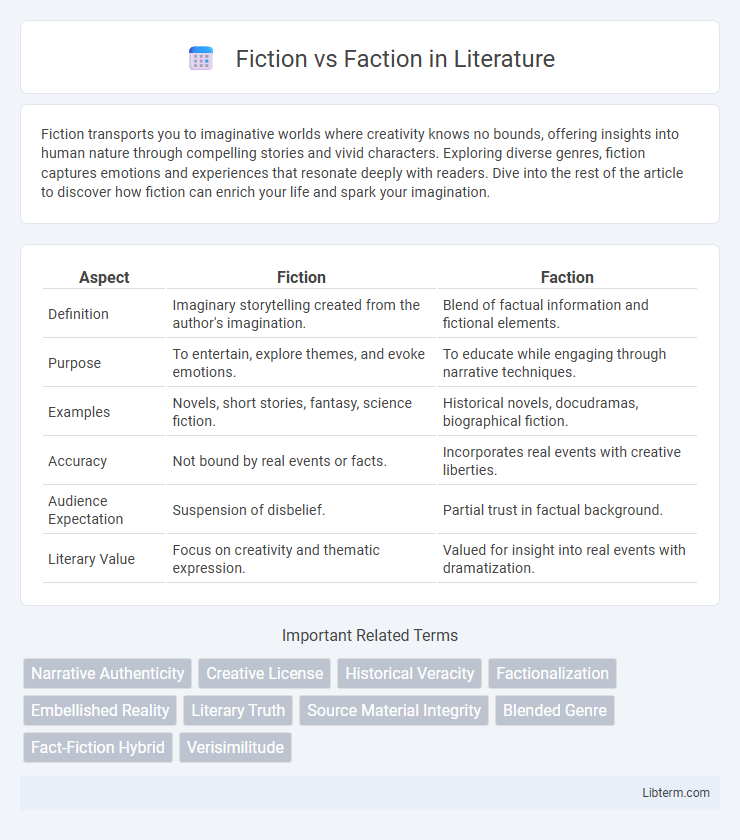Fiction transports you to imaginative worlds where creativity knows no bounds, offering insights into human nature through compelling stories and vivid characters. Exploring diverse genres, fiction captures emotions and experiences that resonate deeply with readers. Dive into the rest of the article to discover how fiction can enrich your life and spark your imagination.
Table of Comparison
| Aspect | Fiction | Faction |
|---|---|---|
| Definition | Imaginary storytelling created from the author's imagination. | Blend of factual information and fictional elements. |
| Purpose | To entertain, explore themes, and evoke emotions. | To educate while engaging through narrative techniques. |
| Examples | Novels, short stories, fantasy, science fiction. | Historical novels, docudramas, biographical fiction. |
| Accuracy | Not bound by real events or facts. | Incorporates real events with creative liberties. |
| Audience Expectation | Suspension of disbelief. | Partial trust in factual background. |
| Literary Value | Focus on creativity and thematic expression. | Valued for insight into real events with dramatization. |
Understanding Fiction: Definitions and Characteristics
Fiction refers to literary works created from the imagination, including novels, short stories, and plays, characterized by invented characters, plots, and settings. It often explores themes, emotions, and hypothetical scenarios that provide insight into human experiences and societal issues. Unlike faction, fiction prioritizes creativity and narrative craft over factual accuracy, allowing for diverse storytelling methods such as allegory, fantasy, and speculative fiction.
What is Faction? Exploring the Genre
Faction is a literary genre that blends factual historical events with fictional elements to create immersive storytelling. It intertwines real-life personalities, settings, and occurrences with imaginative narratives, providing both educational insight and dramatic engagement. This genre appeals to readers seeking a nuanced understanding of history through a compelling, character-driven plot.
Key Differences Between Fiction and Faction
Fiction involves imaginative storytelling with invented characters and events, whereas faction blends factual information with fictional elements, creating a narrative rooted in reality but enhanced for dramatic effect. Fiction prioritizes creativity and narrative freedom, while faction aims to convey real events or truths through a fictionalized lens. Key differences include the reliance on verifiable facts in faction, contrasting with fiction's emphasis on invention and artistic expression.
The Origins and Evolution of Fiction
The origins of fiction trace back to ancient oral traditions where storytelling served as a means of preserving culture and imparting moral lessons, evolving from mythic narratives to structured plots and character development. This evolution saw the rise of written literature in classical civilizations like Greece and Rome, where fiction began to distinguish itself through imaginative creation rather than factual recounting. Over centuries, fiction expanded across genres and mediums, reflecting societal changes and technological advancements while continually exploring human experiences beyond empirical reality.
How Faction Blends Fact and Imagination
Faction seamlessly merges factual events with imaginative storytelling, creating a narrative that is both informative and engaging. By incorporating verified historical details alongside fictional characters or scenarios, faction blurs the lines between reality and creativity, enhancing reader immersion. This hybrid approach appeals to audiences seeking authenticity without sacrificing narrative intrigue.
The Role of Creativity in Fiction Writing
Creativity in fiction writing fuels the imagination, enabling authors to construct unique worlds, complex characters, and compelling plots that transcend reality. This imaginative freedom contrasts with faction, which blends factual information with narrative elements but remains grounded in truth. Emphasizing innovative storytelling techniques and emotional depth, fiction leverages creativity to engage readers on a deeply personal and intellectual level.
Authenticity and Accuracy in Faction Narratives
Faction narratives blend factual accuracy with storytelling elements to create a compelling yet truthful account, ensuring authenticity through rigorous research and verifiable sources. Unlike pure fiction, faction prioritizes the integrity of historical events and real-world details while employing narrative techniques to enhance engagement and clarity. Maintaining this balance demands critical evaluation of sources and a commitment to presenting information faithfully, distinguishing faction from fictionalized interpretations that may sacrifice accuracy for dramatic effect.
Popular Examples of Fiction and Faction
Popular examples of fiction include novels like George Orwell's *1984* and J.K. Rowling's *Harry Potter* series, where imaginative storytelling and invented characters create immersive worlds. Faction blends factual history with narrative flair, exemplified by works such as *In Cold Blood* by Truman Capote and *The Devil in the White City* by Erik Larson, which combine meticulous research with novelistic techniques. These genres cater to readers seeking either pure imaginative entertainment or a compelling interpretation of real events.
Impact on Readers: Fiction vs Faction
Fiction sparks imagination by transporting readers to imaginative worlds, evoking emotions and personal reflection through creative storytelling. Faction, blending fact and fiction, engages readers by presenting real events with narrative techniques, enhancing understanding while maintaining factual integrity. Both genres impact readers by influencing perception, but fiction primarily fosters emotional connection, whereas faction promotes informed awareness.
Choosing Your Path: Writing Fiction or Faction
Choosing your path between fiction and faction hinges on your commitment to creativity versus factual accuracy. Fiction allows boundless imagination, crafting worlds and characters unrestricted by reality, appealing to those driven by artistic expression. Faction demands rigorous research and truthfulness, blending storytelling with documented events to educate and engage readers seeking both information and narrative.
Fiction Infographic

 libterm.com
libterm.com